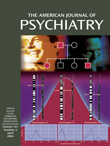To the Editor: Angela E. McHolm, Ph.D., et al.
(1) reported recently on the relation between childhood physical abuse and suicidality among depressed women. They indicated they were unaware that prior “community-based studies have specifically examined suicidality among adults with a history of childhood physical abuse” (p. 934). In fact, a number of community-based studies have examined the specific relation between childhood physical abuse and suicidality
(2). They have appeared in a number of peer-reviewed publications, including premier general medical
(3) and child maltreatment
(4) journals.
Dr. McHolm et al. depicted their specific focus on physical abuse as a strength. However, children are rarely subject to one form of abuse. There is considerable value in examining the ways in which combinations of child maltreatment are associated with psychiatric outcomes in adulthood
(5). Other criticisms of the report by Dr. McHolm et al. can be generalized to other studies of child maltreatment and suicidality. First, they ignored the relations between the duration, intensity, and frequency of abuse and the kinds and degrees of psychiatric outcomes. Second, the kinds and degrees of psychiatric outcomes may vary with the developmental stage (cognitive and socioemotional) at which child maltreatment occurs. Third, popular awareness of physical abuse emerged in 1962 with the reports by Kempe and colleagues of battered child syndrome
(6). Variations in awareness and attitudes about child maltreatment over time
(7) may be associated with age cohort effects in adult psychiatric outcomes. Dependency and vulnerability in later adulthood may arouse memories of similar feelings in childhood. Older adults who reached adolescence before reports of battered child syndrome became well known, when child maltreatment was not discussed openly or publicly, may be less inclined to report elder abuse than their younger peers. Fourth, recall bias is an intrinsic problem of retrospective, cross-sectional research.
Further research with independent corroborators is needed to ascertain the ways in which the confounding nature of retrospectively recalled memories affects adults’ self-reported childhood maltreatment
(8). As an alternative method, one might begin with records of determined cases of child maltreatment in state or county child protective services files and compare victims’ adult psychological functioning by means of a case-control cohort design. Finally, we need to know more about the “ordinary magic” of resilience
(9) relative to psychiatric outcomes of child maltreatment. The majority of victims do not succumb to suicidality or psychopathology, suggesting there may be mediating and moderating factors related to resilience vis-à-vis risks.
Dr. McHolm et al. told us little about the policy or applied practice implications of their research. For many readers of the Journal, these aspects are certain to be more important than the specific source of the researchers’ sample. Replicating the consistent findings of prior research with community-based samples contributes little to our knowledge base. Research in this area could be enhanced significantly by controlling for the developmental stages at which the victims’ maltreatment occurred as well as the historical contexts that shaped attitudes toward abuse and neglect. More sophisticated research is needed, and ultimately, clinical science and our clients benefit with higher standards of research and reporting.

